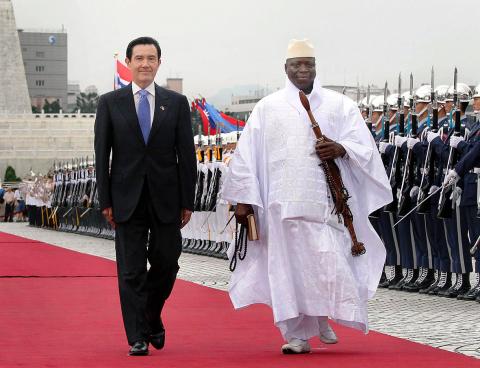Gambian President Yahya Jammeh said that dozens of HIV/AIDS patients in the tiny West African state have been cured using his secret concoction of boiled herbs.
Jammeh first announced he had found a natural remedy to cure AIDS in 2007, stirring anger among Western medical experts, who said he was giving false hope to the sick.
“Who am I to expect that everybody would praise me?” Jammeh said in a state television broadcast on Sunday evening, announcing that 68 patients had been cured and discharged from a treatment center.

Photo: EPA
“Just as the Prophet Mohammed prevailed and established Islam ... I also prevailed to cure HIV/AIDS to the point that 68 are being discharged today,” he said.
The WHO and the UN have said Jammeh’s HIV/AIDS treatment is alarming mainly because patients are required to cease their anti-retroviral drugs, making them more prone to infection.
The president said the cured group was the seventh batch of HIV/AIDS patients undergoing his herbal remedy to have been discharged since the treatments began five years ago.
Jammeh came to power in the Gambia, a sliver of land on Africa’s west coast that is popular with sun-seeking European tourists, in a bloodless military coup in 1994.
He is accused by activists of human rights abuses during his rule and he most recently drew international criticism for executing nine death-row inmates by firing squad.
Jammeh said on Sunday that his government would fully integrate “natural medicine” to all the country’s hospitals, to complement Western medical techniques.
Other African leaders have drawn criticism for extolling the power of natural remedies to combat AIDS.
The administration of former South African president Thabo Mbeki was ridiculed for denying there was a link between HIV and AIDS, while prescribing meaningless treatments such as beetroot instead of internationally proven medicines.
The HIV rate in Gambia is relatively low compared with other African states, with 2 percent of the country’s roughly 1.8 million people infected, according to the UN.

BOMBARDMENT: Moscow sent more than 440 drones and 32 missiles, Volodymyr Zelenskiy said, in ‘one of the most terrifying strikes’ on the capital in recent months A nighttime Russian missile and drone bombardment of Ukraine killed at least 15 people and injured 116 while they slept in their homes, local officials said yesterday, with the main barrage centering on the capital, Kyiv. Kyiv City Military Administration head Tymur Tkachenko said 14 people were killed and 99 were injured as explosions echoed across the city for hours during the night. The bombardment demolished a nine-story residential building, destroying dozens of apartments. Emergency workers were at the scene to rescue people from under the rubble. Russia flung more than 440 drones and 32 missiles at Ukraine, Ukrainian President Volodymyr Zelenskiy

‘SHORTSIGHTED’: Using aid as leverage is punitive, would not be regarded well among Pacific Island nations and would further open the door for China, an academic said New Zealand has suspended millions of dollars in budget funding to the Cook Islands, it said yesterday, as the relationship between the two constitutionally linked countries continues to deteriorate amid the island group’s deepening ties with China. A spokesperson for New Zealand Minister of Foreign Affairs Winston Peters said in a statement that New Zealand early this month decided to suspend payment of NZ$18.2 million (US$11 million) in core sector support funding for this year and next year as it “relies on a high trust bilateral relationship.” New Zealand and Australia have become increasingly cautious about China’s growing presence in the Pacific

Indonesia’s Mount Lewotobi Laki-Laki yesterday erupted again with giant ash and smoke plumes after forcing evacuations of villages and flight cancelations, including to and from the resort island of Bali. Several eruptions sent ash up to 5km into the sky on Tuesday evening to yesterday afternoon. An eruption on Tuesday afternoon sent thick, gray clouds 10km into the sky that expanded into a mushroom-shaped ash cloud visible as much as 150km kilometers away. The eruption alert was raised on Tuesday to the highest level and the danger zone where people are recommended to leave was expanded to 8km from the crater. Officers also

ESPIONAGE: The British government’s decision on the proposed embassy hinges on the security of underground data cables, a former diplomat has said A US intervention over China’s proposed new embassy in London has thrown a potential resolution “up in the air,” campaigners have said, amid concerns over the site’s proximity to a sensitive hub of critical communication cables. The furor over a new “super-embassy” on the edge of London’s financial district was reignited last week when the White House said it was “deeply concerned” over potential Chinese access to “the sensitive communications of one of our closest allies.” The Dutch parliament has also raised concerns about Beijing’s ideal location of Royal Mint Court, on the edge of the City of London, which has so